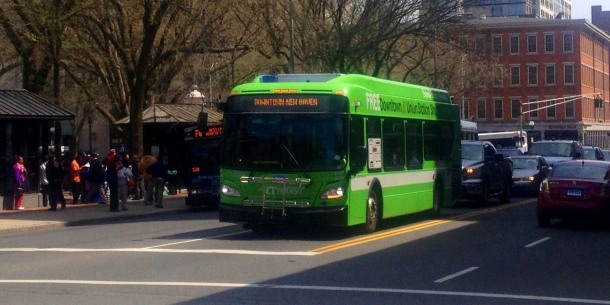Electric vehicle expansion, small-scale energy generation, protections for Long Island Sound, and transit funding are just a few things on the agenda for 2015.
Connecticut’s legislative session starts today and we’re excited about the initiatives we’ll be working on with our allies over the next six months! Read on to learn more about plans to expand electric vehicles in Connecticut, ways to make it easier for residents to “share” solar power, new protections for Long Island Sound, increased transit funding, and more. And as always, we’ll be on the lookout for bad bills that threaten our environment and our health.
If you want to get the latest updates and make a difference during session, join our activist email alert list. And in case you missed any of the victories from last year’s session, you can find our recap of 2014 here.
Climate and Energy
We’re working with a coalition of environmental organizations, industry leaders, and the Department of Energy and Environmental Protection (DEEP) to tackle a big clean air priority this session: increasing use of electric vehicles. Reducing our reliance on gas-powered vehicles can help cut the nearly 40% of Connecticut’s greenhouse gas emissions that come from transportation and help meet the state’s Clean Cars goals. We’re aiming for legislation to combine state incentives with existing federal incentives to make electric vehicles cost-competitive with traditional cars. Perks like free parking, unrestricted HOV lane access, and cheaper electricity rates for charging at certain times of day can also help convince consumers to make the switch.

We’re also seeking to promote renewable and low-emission energy sources like solar, wind, fuel cells, and combined heat and power by clearing the path for more clean distributed electricity generation (DG). We support related legislation that would authorize shared solar systems to operate in Connecticut, which would enable people who can’t install solar panels—such as renters—to reap the benefits of solar energy. Alongside public health and environmental benefits, distributed generation projects—including shared solar—increase the resilience of our electric grid and lowers energy transmission costs. We support legislation directing DEEP to figure out the value that clean DG provides to ratepayers, the grid, and society. Clean energy producers can then be compensated with a tariff for the value their energy provides.
Meeting Connecticut’s climate goals will requires a transition away from fossil fuels like coal, oil, and natural gas, and towards truly clean and renewable sources of energy. We’ll seek opportunities to promote renewable energy in Connecticut and defend the state’s clean energy and efficiency funds against any cuts.
Long Island Sound and Clean Water
This is a budget year, so we’ll be working hard with our partners in the Clean Water Investment Coalition to make sure Connecticut’s commitment to the Clean Water Fund stays strong. Two years ago, the legislature approved historic levels of funding to help towns upgrade their sewer and stormwater systems, and last year we worked with DEEP to ensure that money was set aside to build green infrastructure. We hope to build on that success.

A Blue Plan for Long Island Sound is again a priority for us this year. The Sound’s 1,320 square miles need an inventory of current uses and a guide for the future. We’ll work with our allies to establish a Blue Plan Advisory Committee (BPAC) that sets New York and Connecticut on a path to planning for the future uses of Long Island Sound.
Plans are still being formulated, but be sure to stay tuned for news about a possible bill on coastal resiliency and flooding due to climate change! This is an area that will likely become even more important in Connecticut in the coming years, so it’s vital to get started early.
Transit
Ideas are also underway on how elected officials and transit supporters can work together to develop a statewide, long-range plan for transportation. To keep our economy competitive in the 21st century and meet our climate goals, Connecticut needs a safe, convenient, multi-modal transit and transportation system that provides options for all residents and encourages use of cleaner transportation like trains, buses, and low-emissions private vehicles.
Governor Malloy has indicated that transportation will be a major focus this year. TransformCT, the Department of Transportation’s strategic planning process that’s been gathering input from residents, is expected to issue its recommendations in the next couple months.
As federal transportation funding declines, finding enough money to keep our rails and roads in good order and to keep buses running is a battle. This legislative session, we’ll work to secure more funding for a jobs access program for transit, opening new job opportunities to workers without cars.
Priorities of the state and environmental allies
Priorities at the Department of Energy and Environmental Protection include stewardship of vulnerable wildlife and environmentally sensitive areas, connecting people to nature through its “no child left inside” program, sustainable materials management and moving away from trash-to-energy plants, cleaning up contaminated sites, and increasing clean energy.
Other environmental allies around the state have priorities that CFE/Save the Sound may be supporting in various capacities. We wish our allies luck on these important initiatives!
Connecticut has made big strides in recent years in protecting the health of our kids, our water, and our wildlife by limiting the use of pesticides on fields for elementary and middle school children. This year, advocates and many municipalities would like to expand these regulations to apply to high schools and parks to make sure all kids are safe.
Since Connecticut is one of the most densely populated states in the nation, protecting the forests, parks, farms, and wetlands we do have is crucial. A public use registry of open space would help residents, conservation organizations, and lawmakers understand how much and what kind of open space the state already has—which will help us to protect current space and build support for acquiring more. Similar entities already exist in nearby states. Quantifying the value of open space, in terms of avoided costs of development and the carbon sequestration benefits, can only strengthen the argument for protecting more land.
So there you have it—a quick summary of environmental issues likely to be on the table for this year’s legislative session! As always, new issues come up during session, so be sure to sign up for our email alerts to get up-to-the-minute details. Thanks for your support as we work with our allies in the legislature, at DEEP, and at fellow environmental organizations to make the laws that protect Connecticut’s land, air, and water even stronger this session.
Posted by Sarah Ganong, Media Coordinator at CFE/Save the Sound

